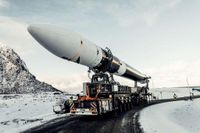On March 24, 2025, the highly anticipated test flight of the Spectrum rocket by Isar Aerospace was abruptly halted just moments before launch due to unfavorable wind conditions at the Andøya Spaceport in Norway. Scheduled to take off between 12:30 PM and 3:30 PM (CET), this mission was significant not just for the startup but for the whole of Europe, potentially marking a turning point in its space endeavors.
Isar Aerospace, based in Munich and founded in 2018, aimed with the Spectrum rocket to become a key player in the European space industry. If successful, this launch would signify the first time a private German rocket has reached space, defined as surpassing the Kármán line, an altitude of 100 kilometers. Many were eager to see how this test flight would unfold, especially considering it had been seven years in development, a notably swift timeline in such a complex field.
Despite the launch being postponed, the Spectrum's mission, dubbed "Going Full Spectrum," is a pure test flight, primarily intended to gather as much technical data as possible to improve future missions.
CEO Daniel Metzler conveyed the experimental nature of the venture, stating, "The aim is ideally for it to explode in flight and not at the launch site," emphasizing that even a total failure could yield critical insights.
The Spectrum rocket boasts impressive specs, measuring 28 meters in length and 2 meters in diameter, powered by two stages with a total of ten Aquila engines using a combination of oxygen and propane. With a thrust equivalent to 1.3 million horsepower and fueled by 40 tons of propellant, it can carry a payload of up to 1,000 kilograms into a low Earth orbit (LEO).
Although it is unlikely that the rocket would achieve orbit on its first test attempt, the entire mission is designed to test various parameters. Metzler indicated that successes could still emerge from limited flight durations, stating, "Success for me means flying for 30 seconds even if the rocket explodes." Returning to the launchpad post-launch with more insight and experience would be the objective.
Isar Aerospace's ambitions do not stop at the first test flight. The startup has plans to construct up to 40 rockets per year in the medium term and is eager to establish itself as a commercial satellite launcher from Europe. This mission is particularly timely as discussions of bolstering European defense capabilities have intensified, particularly around the necessity for independent satellite communications. Metzler remarked, "Without satellite communication, our defense is practically blind..." underscoring the importance of aerospace technology for national security.
The need for independent navigation tools and surveillance has become paramount. Historically, Europe heavily relied on American satellites for these functions. As highlighted by Metzler, investments in naval capabilities without supporting satellite infrastructure have been inadequate. The ongoing reliance on foreign entities for such critical technology represents a weakness in Europe's security architecture.
In light of the postponed launch, discussions about the future of European space travel have surfaced. Experts note that the focus must be redirected toward increasing investments in space technology rather than traditional military equipment. As Hendrik Brandis, co-founder of the venture capital firm Earlybird and a member of Isar Aerospace's supervisory board, stated, the launch of the Spectrum rocket today represents a vital step forward for Europe's ambitions in space.
The success of this test flight could pave the way for a new era in which Europe relies less on external support and cultivates its ecosystem of aerospace innovation. Furthermore, the ongoing investment from the NATO Innovation Fund serves as a testament to the strategic importance of this undertaking.
While the exact reschedule date for the launch remains undetermined, the company is eager to return to the launchpad as soon as possible. With the next rocket, "Spectrum 2," already prepared, Isar Aerospace embodies the spirit of innovation and resilience that characterizes modern aerospace ventures.
As Europe navigates its increasing ambition in space, this test flight stands as a crucial first step not just for Isar Aerospace, but for tailored European advancements that could revolutionize national defense and satellite communications for years to come.






